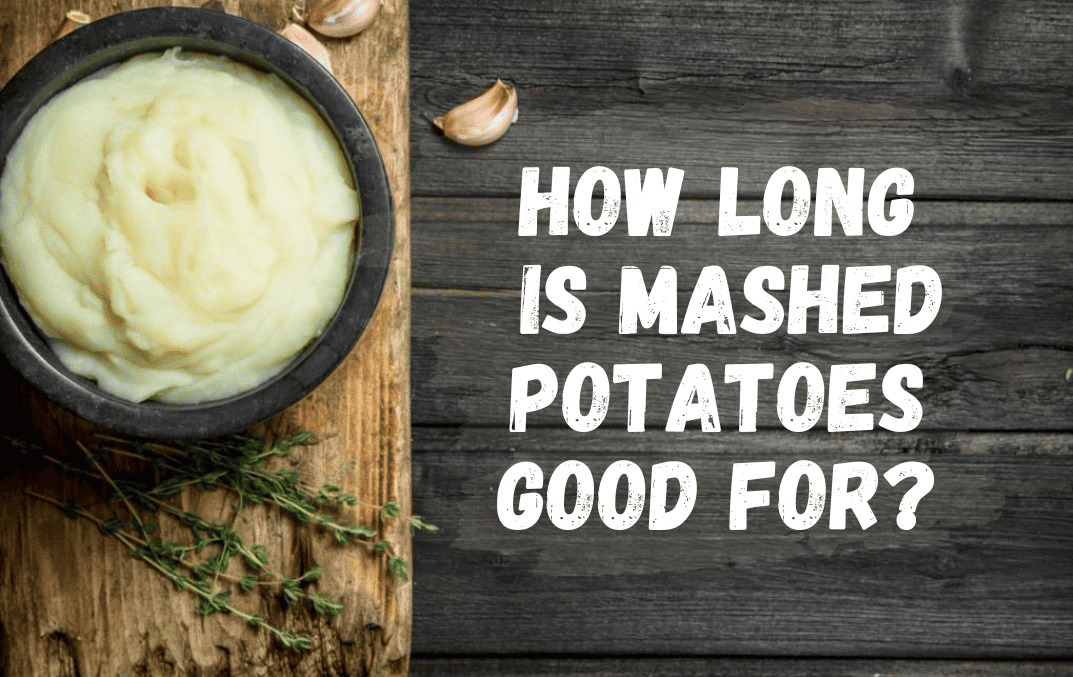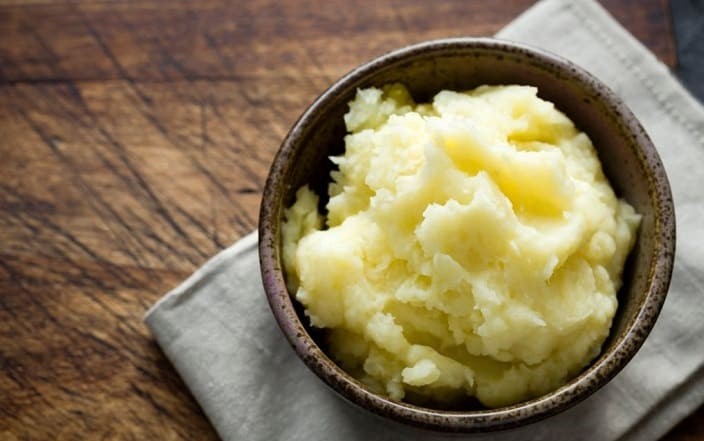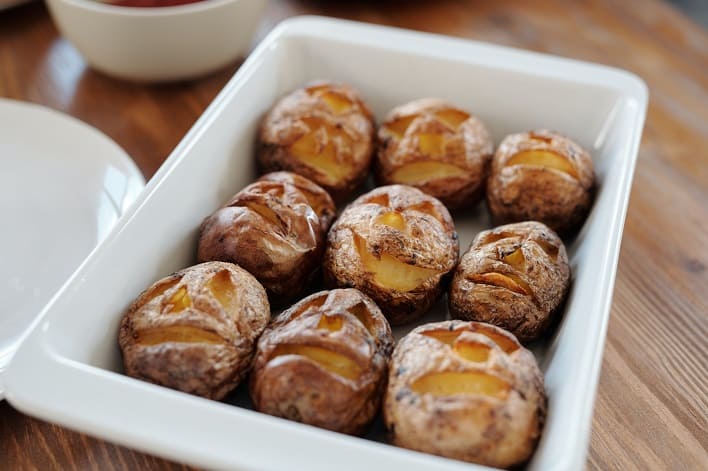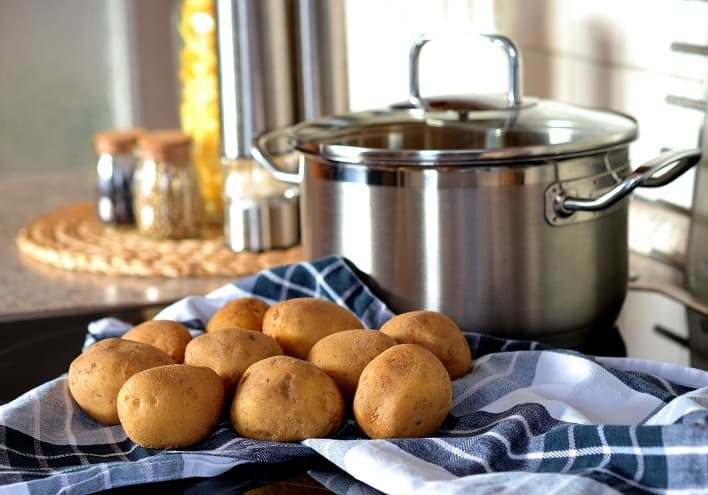
How long is Mashed Potatoes Good For? The answer is that Mashed potatoes can last up to 3-5 days in the refrigerator when stored properly. To maximize the shelf-life of mashed potatoes, store them in an airtight container and keep it in the coldest part of the refrigerator.
Welcome to our informative guide on the longevity of mashed potatoes! If you’ve ever found yourself wondering, “How long are mashed potatoes good for?” then you’ve come to the right place. Mashed potatoes are a beloved culinary delight, but their shelf life can be a concern.
In this article, we will delve into the factors that affect the freshness and quality of mashed potatoes, providing you with valuable insights into storage techniques and expiration guidelines.
What Are Mashed Potatoes?

Mashed potatoes are a beloved dish created by cooking potatoes until they are soft and easily mashed. In result smooth and creamy texture gives. Typically, the potatoes are boiled or steamed after being peeled, and then they are drained and mashed using tools like a potato masher, fork, or food mill.
To enhance the flavor and texture, various ingredients are added to mashed potatoes. These can include butter, milk, cream, sour cream, or cream cheese, which are mixed in to create a luscious and rich consistency. Seasonings like salt, pepper, and garlic powder are commonly used to add a delightful taste.
Mashed potatoes serve as a versatile side dish that pairs well with a wide range of main courses, such as roasted meats, poultry, stews, and even vegetarian dishes. While they are especially popular during holiday meals like Thanksgiving and Christmas, mashed potatoes can be enjoyed throughout the year, providing comfort and satisfaction as a delightful accompaniment to numerous meals.
How long is Mashed Potatoes Good for in the Fridge?
Mashed potatoes typically stay fresh in the refrigerator for around 3 to 5 days, although this can vary depending on factors like ingredients and storage conditions. To maximize their shelf life, follow these tips:
- Allow the mashed potatoes to cool down before transferring them to an airtight container. Avoid putting hot or warm mashed potatoes directly into the fridge, as it can raise the overall temperature and promote bacterial growth.
- Store the mashed potatoes in the refrigerator promptly, ideally within two hours of cooking.
- Ensure the storage container is airtight to prevent moisture and odors from affecting the mashed potatoes.
- Consume the mashed potatoes within 3 to 5 days for the best taste and quality. Beyond this time, the texture and flavor may deteriorate.
If you have leftover mashed potatoes that you won’t be able to eat within the recommended timeframe, freezing them is an option. Frozen mashed potatoes can last for several months. To freeze them, transfer the mashed potatoes to a freezer-safe container, leaving some room for expansion, and seal it tightly. Thaw the frozen mashed potatoes in the refrigerator before reheating.
How long is Mashed Potatoes Good For in the Freezer?
Mashed potatoes can last in the freezer for approximately 2 to 3 months when stored correctly. Freezing mashed potatoes is an effective way to extend their shelf life beyond the typical 3 to 5 days in the refrigerator. Here are some guidelines to ensure optimal freezing and storage:
- Allow the mashed potatoes to cool completely before freezing. It’s crucial to avoid freezing them while they’re still hot or warm, as it can result in uneven texture and quality.
- Transfer the mashed potatoes to freezer-safe containers or freezer bags. Be sure to remove any excess air from the containers or bags to prevent freezer burn.
- Label the containers or bags with the freezing date to keep track of storage time.
- Place the mashed potatoes in the freezer promptly after they have cooled down.
- When ready to use, thaw the frozen mashed potatoes in the refrigerator overnight before reheating or consuming. This gradual thawing process helps preserve the texture and taste.
Keep in mind that freezing and thawing can cause a slight change in the texture of mashed potatoes due to the moisture content. However, with proper storage and reheating, the frozen mashed potatoes can still be a delicious option.
Storage Tips on How Long is Mashed Potatoes Good For

Refrigerating Mashed Potatoes
Refrigerating mashed potatoes is a great way to keep them fresh for a few days. To do this, first allow the mashed potatoes to cool down for a short period after cooking. Then, transfer them to an airtight container or a resalable plastic bag, ensuring the container is clean.
It’s important to store the mashed potatoes in the refrigerator promptly, ideally within two hours of cooking, to minimize the risk of bacterial growth. When storing, position the container in a part of the refrigerator where the temperature is consistently cold, such as the main compartment, and avoid storing them in the refrigerator door as the temperature there fluctuates more.
To keep track of freshness, label and date the container if you plan to store the mashed potatoes for more than a day. Generally, mashed potatoes can refrigerate for 3 to 5 days, after which it’s best to discard them to ensure food safety and quality.
Freezing Mashed Potatoes
Freezing mashed potatoes is an excellent way to extend their shelf life beyond the typical 3-5 days in the refrigerator. To freeze mashed potatoes, it’s important to start by cooling them completely at room temperature. Once cooled, transfer the mashed potatoes to freezer-safe containers or resealable freezer bags, ensuring they are clean and appropriate for freezing. If using bags, remove excess air to prevent freezer burn, and if using containers, leave some space at the top to allow for expansion during freezing.
Label and date the containers or bags before placing them in the freezer as soon as possible after sealing them. It’s crucial to freeze the mashed potatoes within a few hours of preparation to maintain their quality. To use the frozen mashed potatoes, thaw them in the refrigerator overnight before reheating them gently on the stovetop or in the oven. Add a little liquid like milk or broth if needed to restore their creamy consistency.
When stored correctly, mashed potatoes can last in the freezer for around 2 to 3 months. However, it’s worth noting that the texture may slightly alter after freezing and thawing due to changes in moisture content. Nevertheless, with proper storage and reheating, the frozen mashed potatoes can still be a convenient and tasty option.
Thawing and Reheating
When ready to use frozen mashed potatoes, thaw them in the refrigerator overnight. Gradual thawing helps maintain the texture. Reheat the thawed mashed potatoes in the oven or on the stovetop, adding a little extra liquid if needed, to restore their creamy consistency.
Shelf Life
The shelf life of mashed potatoes relies on the storage method employed. When refrigerated in an airtight container, mashed potatoes can typically maintain their quality for 3 to 5 days. After this duration, the flavor may diminish, and the risk of bacterial growth increases. For optimal freshness and safety, it is advisable to consume them within this timeframe.
On the other hand, freezing mashed potatoes can significantly extend their shelf life. Properly stored in the freezer, mashed potatoes can last around 2 to 3 months while retaining their quality and taste. Beyond this period, the texture and flavor may gradually deteriorate. Nevertheless, if the frozen mashed potatoes have been stored at a constant freezing temperature, they may still be safe to consume.
It is important to remember that these are general guidelines and various factors can influence the shelf life, including the ingredients used, storage conditions, and proper food handling practices. Always rely on your judgment and consider the appearance, smell, and taste of the mashed potatoes before consuming them. If any signs of spoilage, such as an off smell, mold, or unusual discoloration, is noticed, it is recommended to discard them to ensure food safety.
What Happens If You Eat Bad Mashed Potatoes?

- Consuming bad or spoiled mashed potatoes can result in food poisoning or gastrointestinal discomfort. This occurs when harmful bacteria or toxins are present in the spoiled food and ingested. Symptoms of food poisoning can include nausea, vomiting, diarrhea, stomach cramps, and sometimes fever.
- Signs that mashed potatoes have gone bad include a sour or rancid smell, the presence of mold, or noticeable changes in color or texture. If any of these signs are observed, it is crucial to discard the mashed potatoes to avoid the risk of foodborne illness.
- If you accidentally consume spoiled mashed potatoes and experience symptoms of food poisoning, it is important to stay hydrated and seek medical attention if the symptoms are severe or persist. While most cases of food poisoning from spoiled mashed potatoes resolve within a few days, consulting a healthcare professional is advisable for proper guidance and treatment.
- To prevent the consumption of bad mashed potatoes, it is essential to practice proper food safety measures. This includes storing mashed potatoes at the appropriate temperatures, adhering to recommended storage times, and being vigilant for any signs of spoilage before consuming them.
Conclusion: How long is Mashed Potatoes Good For?
In conclusion, mashed potatoes have a refrigerated shelf life of 3 to 5 days when stored in an airtight container. Freezing mashed potatoes extends their shelf life to around 2 to 3 months, maintaining their quality. It is crucial to take into account ingredients, storage conditions, and proper food handling practices. Always rely on your senses to detect signs of spoilage such as a sour smell, mold growth, or abnormal color or texture. By following these guidelines, you can ensure the freshness and safety of your mashed potatoes.
Reference
- Shelf-life modeling of microwave-assisted thermal sterilized mashed potato in polymeric pouches of different gas barrier properties
- Effect of gums on the rheological, microstructural and extrusion printing characteristics of mashed potatoes
- Potato intake and incidence of hypertension: results from three prospective US cohort studies
- 4D printing of mashed potato/purple sweet potato puree with spontaneous color change
FAQs
Can mashed potatoes go bad if kept in the fridge?
Yes, mashed potatoes can go bad if kept in the fridge for too long. While refrigeration can help prolong their freshness, mashed potatoes will eventually spoil due to the growth of bacteria. According to recommendation consume refrigerated mashed potatoes within 3 to 5 days for optimal safety and quality.
Do instant mashed potatoes go bad after the expiration date?
Instant mashed potatoes, like any food product, can go bad after the expiration date. The expiration date indicates the recommended time period for consuming the product while it’s at its best quality. Consuming instant mashed potatoes after the expiration date increases the risk of consuming spoiled or degraded food. It’s best to follow the expiration date guidelines provided on the packaging.
How long do cooked mashed potato slices last in the fridge?
Cooked mashed potato slices can last in the fridge for approximately 3 to 4 days when stored properly in an airtight container. However, the quality may deteriorate over time, and there is a higher risk of bacterial growth. It’s advisable to consume them within this timeframe to ensure freshness and safety.
Can I eat refrigerated mashed potato?
Yes, you can eat refrigerated mashed potatoes as long as they have been stored properly and are within the recommended storage timeframe of 3 to 5 days. However, it’s essential to check for signs of spoilage, such as a sour smell, mold growth, or unusual color or texture. If any of these signs are present, it’s best to discard them.
Should mashed potatoes be gray or white?
Mashed potatoes should have a white or off-white color. If mashed potatoes appear gray, it may indicate that they are spoiled or oxidized. Gray coloration can be a sign of bacterial growth or exposure to air. It’s best to avoid consuming mashed potatoes with a grayish color.
Can you eat mashed potatoes with diverticulitis?
If you have diverticulitis, it’s important to consult with your healthcare provider regarding your dietary restrictions. While mashed potatoes are soft and easily digestible food, individual tolerances may vary. Your healthcare provider can provide specific guidance on your diet.
Can you freeze mashed potatoes?
Yes, you can freeze mashed potatoes. Freezing mashed potatoes is a great way to extend their shelf life. Allow the mashed potatoes to cool completely, transfer them to a freezer-safe container or freezer bags, and store them in the freezer. When you’re ready to use them, thaw them in the refrigerator overnight and reheat them gently on the stovetop or in the oven.
Is it possible to make hash browns out of mashed potatoes?
It is possible to make hash browns out of mashed potatoes. Simply shape the mashed potatoes into patties or small portions, and then cook them in a skillet with some oil until they are crispy and golden brown. This can be a delicious way to repurpose leftover mashed potatoes.
How long should you soak potatoes for mashed potatoes?
Soaking potatoes before making mashed potatoes is not necessary. However, if you prefer to soak them, it can help remove excess starch and make the potatoes less sticky. Soaking for about 15-30 minutes in cold water can suffice. Rinse the potatoes thoroughly after soaking before proceeding with cooking.
Is it okay to eat potatoes that were left out overnight?
It is generally not safe to eat potatoes that were left out overnight. Potatoes are a perishable food item and can quickly develop harmful bacteria if not stored properly. Leaving them out at room temperature allows for bacterial growth, which can lead to foodborne illnesses. It’s best to discard potatoes that have been left out overnight to ensure food safety.
What is the best way to warm up leftover mashed potatoes?
The best way to warm up leftover mashed potatoes is to reheat them gently on the stovetop or in the oven. Add a small amount of liquid, such as milk or butter, to prevent them from drying out. Stir occasionally to ensure even heating and prevent sticking.
How do I keep mashed potatoes warm in an oven?
To keep mashed potatoes warm in an oven, preheat the oven to a low temperature, around 200°F (93°C). Transfer the mashed potatoes to an oven-safe dish and cover it with foil. Place the dish in the preheated oven to keep the mashed potatoes warm until serving.
How do I keep mashed potatoes warm?
To keep mashed potatoes warm for a shorter period of time, you can use a double boiler method. Place the mashed potatoes in a heatproof bowl or pot, and set it over a larger pot filled with simmering water. Stir the mashed potatoes occasionally to prevent them from sticking or forming a skin.
Why does nobody eat mashed potatoes for breakfast?
Mashed potatoes are not commonly eaten for breakfast in many cultures or regions. Breakfast preferences and traditions vary across different countries and cuisines. In some cultures, mashed potatoes are more commonly associated with lunch or dinner meals. Breakfast options often include dishes such as cereal, eggs, toast, or pastries, which are more traditional morning fare. However, personal preferences and cultural variations can always lead to unique breakfast choices, so mashed potatoes for breakfast can be enjoyed by individuals who prefer it.
